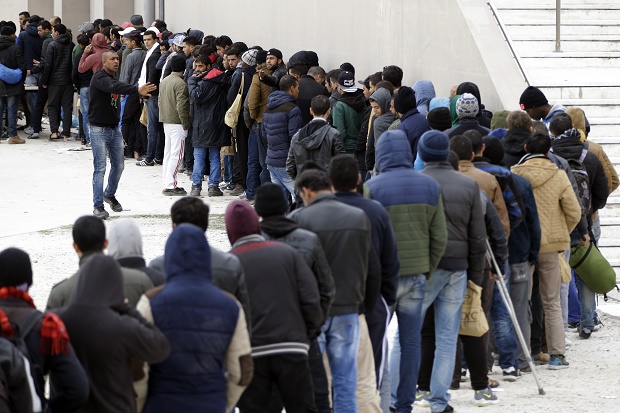Trapped in Greece by EU refugee rules, migrants desperate to get out

People queue for food at a former Olympic indoor stadium in Faliro, southern Athens, on Friday, Dec. 11, 2015. Hundreds of migrants have been temporarilyy housed in the stadium after being removed this week from Greece’s northern border with Macedonia, which only allows Syrians, Afghans and Iraqis through on their trek to wealthier European countries _ rejecting others as economic migrants who do not merit refugee protection. Greek authorities have urged migrants who can’t continue north to seek asylum in Greece or return home. AP Photo
ATHENS, Greece—Guylo is a musician, looking for a place of peace to play his guitar. Fares wants to study. Mohammed is waiting for news of his wife and child after becoming separated from them en route.
READ: 1st 30 refugees to be relocated from Greece head to Luxembourg
All are migrants trapped in Greece after being barred from continuing their odyssey through Europe—and are desperate to get out.
“We are looking for (smuggler) networks, do you know someone?” asks Guylo, 37, who fled fighting in the Democratic Republic of Congo.
“I will do anything to get somewhere where I can be at peace, do my business, play my music,” he says, adding that Paris would be his first choice.
In recent weeks, thousands of migrants have been blocked in Greece following a decision by several European nations to only allow transit through their borders to refugees from Syria, Iraq and Afghanistan.
Earlier this week, over 2,000 mainly African migrants were taken to Athens from the Greek border with Macedonia to the north, and lodged in a former Olympic taekwondo hall in the south of the capital.
Conditions are poor in the facility that authorities say can nominally accommodate 300 people in an emergency.
“We sleep on the floor, there are no mattresses, there is no hot water,” says Mohammad, a 36-year-old Palestinian who became separated from his wife and child on the Macedonia border.
The migrants receive three meals a day from humanitarian agencies, but they sleep on a concrete floor, sanitation is basic and brawls are common. Used pasta and soup cartons lay strewn about.
‘We can’t take any more’
“We are scared here, we can’t take any more,” says Guylo.
“The Moroccans go out and buy beer and once they have drunk it, they start provoking people or fight among each other,” he adds.
The previous night, three people were injured in a fight that apparently broke out over an attempted cellphone theft.
“There are Moroccans, Algerians, Yemenis, Eritreans, it’s easy for a brawl to break out,” says local mayor Dionysis Hatzidakis.
“Right now there is order but this can’t go on…they need to be contained here and eventually deported,” he says.
Greece, in economic crisis for the past five years, says it plans to repatriate what it calls economic migrants as it lacks the capacity to accommodate them.
“Those without papers, the so-called illegal migrants, have the right to request asylum (or) the right to voluntary repatriation,” junior interior minister for migration Yiannis Mouzalas said this week.
“If they do not request either within 30 days, they will be returned to their countries of origin,” he said.
State agency ANA on Friday reported that many migrants are returning to the island of Lesbos—the main point of entry into Europe from Turkey— hoping to get falsely re-registered as Syrian, Iraqi or Afghan and have a better chance of crossing the border.
“I want to go to any country where I can study. In Yemen the university closed because of the war,” said 21-year-old Fares.
“I can’t live there, only die. Every day somebody dies,” he said.
Others are trying their luck in central Athens, where there are smuggling contacts eager to offer passage to Europe for the right fee.
“The deals are closed in kebab and mobile telephony stores owned by Arab speakers and Pakistanis around Victoria Square,” says a source with knowledge of the matter, speaking on condition of anonymity.
“There are over 40 operators…any Arab speaker can do the job. With the cash from 50 migrants they can hire a coach without much difficulty, there are thousands available,” the source adds.
Macedonia this week began building a second barrier on its border with Greece. An alternative route to central Europe runs through Albania but Guylo says that route is fraught with peril.
“We didn’t try because we have been told it is very dangerous …people get killed there. There were other people that tried to make this crossing but it didn’t work,” he said.
Athens has faced heavy scrutiny lately over its screening of the more than 750,000 migrants who have landed on its shores this year, following revelations that two jihadists involved in last month’s Paris terror attacks slipped into Europe through Greece posing as refugees.
Prime Minister Alexis Tsipras on Friday admitted Greek border controls had been overwhelmed by the mass arrivals earlier this year, but insisted all migrants were now being properly documented.
His defense came after the European Commision this week launched legal procedures against Croatia, Greece and Italy for failing to register all migrants in the EU asylum fingerprint database Eurodac when they first arrive on the continent.
RELATED STORIES
Latest migrant tragedy in Aegean highlights EU divisions